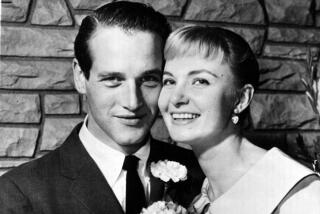Loyola Marymount scholar analyzes Obama’s Bible references in public addresses
When President Obama cites the Bible in his public speeches, he expresses a faith rooted in the African American church as well as a refusal to cede the realm of religion to Republicans, according to a theology professor at Loyola Marymount University.
“He seems willing to engage in the battle on how religion is felt on the public stage,” the professor, Jeffrey S. Siker, said at a recent meeting of biblical scholars. “It’s very deep and very personal for him.”
Siker’s academic paper on Obama’s use of the Bible was among dozens presented at the 73rd international conference of the Catholic Biblical Assn. of America, held at the Loyola Marymount campus in west Los Angeles. About 250 delegates attended, some traveling from places including Ireland, Rome, Africa and Australia.
For his paper, Siker analyzed Obama’s two books, “Dreams From My Father” and “The Audacity of Hope,” as well as several of the president’s key speeches.
Obama’s memoirs show that he was exposed, as the child of an anthropologist mother, to many religious traditions, but found his faith as an adult while exploring the African American side of his identity at the Trinity United Church of Christ on the south side of Chicago.
Siker found that the president quotes the Old Testament most often in his public addresses, in particular the Exodus story of liberation from slavery, an oft-mentioned biblical theme in the African American community.
“This blending of stories allows for powerful improvisations and riffs on the biblical narrative as it is retold and reappropriated in the 20th and 21st centuries,” Siker said. “Barack Obama has made effective use of this merged story in his political rhetoric.”
But the two most prevalent motifs that Obama draws from the Bible are that “we are our brother’s keeper” ( Genesis 4:9) and the notion of the “Joshua generation.”
“This vision of being my brother’s keeper has important political and social consequences when it comes to such issues as healthcare, consumer protection or education reform,” Siker said at the meeting.
In the run-up to the 2008 presidential campaign, Obama dubbed the younger generation of Americans the Joshua generation that must finish the work of what he called the “Moses generation,” older Americans who made sacrifices to bring the nation this far. (Joshua, according to the biblical story, became leader of the Israelites after God barred Moses from entering the promised land.)
“The previous generation, the Moses generation, pointed the way,” Obama said in a March 2007 speech in Selma, Alabama. “So the question, I guess, that I have today is what’s called of us in this Joshua generation? What do we do in order to fulfill that legacy; to fulfill the obligations and the debt that we owe to those who allowed us to be here today?”
In June of 2008, Obama’s campaign launched the “Joshua Generation Project,” calling on young Christian voters to live out this biblical narrative.
Siker, who researches the history of the Bible’s reception in various societies, has spent the past 15 years studying how presidents from Jimmy Carter onward relate to the Bible.
Until the 1960 election of President John F. Kennedy, a Roman Catholic, religion played no significant role in presidential politics, Siker said in an interview after presenting his paper. Kennedy, the first non-Protestant in office, felt compelled to reassure the public he would observe the separation of church and state.
In the 1970s, President Jimmy Carter, a born-again Christian who attended church each week, spoke openly in media interviews about his personal religious convictions. But he was careful to keep references to the Bible out of his public speeches.
Siker said President Ronald Reagan, who rarely went to church, made frequent references to the Bible. Reagan asserted that the Bible was “on our side” as the United States battled evil in the world, an apocalyptic vision that Siker said resonated with the evangelical Christians who were becoming a political force in the 1980s.
President George W. Bush went even farther, according to Siker, who said Bush considered his presidency “a call” from God for America to spread democracy, and even “light,” to the world. As governor of Texas, Bush declared a “Jesus Day”; as president, he held Bible study sessions at the White House and once remarked that Jesus was his favorite politician, Siker said.
Obama, by contrast, quotes Scripture as “wisdom literature” to be applied to contemporary issues in a pluralistic way, the professor said. The lessons Obama draws publicly from the Bible also conform to his rational and pragmatic sides.
Siker added that Obama places more weight on the Ten Commandments and the Bible passages about love than on more obscure lines such as the one in Romans condemning same-gender relations. “There’s a hierarchy of passages. He takes the ones that appeal to the broadest base,” Siker said.
In both “The Audacity of Hope” and a June 2006 speech on faith and public policy, Obama spelled out some of his thoughts.
“Which passages of Scripture should guide our public policy? Should we go with Leviticus, which suggests slavery is okay and that eating shellfish is an abomination? How about Deuteronomy, which suggests stoning your child if he strays from the faith?” Obama, then a U.S. senator, said in the speech in Washington D.C. “Or should we just stick to the Sermon on the Mount — a passage that is so radical that it’s doubtful that our own Defense Department would survive its application?”
The answer, Obama said in the speech, was that religiously motivated people must find principles that are accessible to people of all beliefs, including those with no faith at all. “In a pluralistic democracy, we have no choice,” he said.
Siker believes that Obama, as a believer and a pragmatist, would have no problem with children praying in public schools but would consider it a violation of rights if they were required to pray in school.
“Obama is trying to find common ground so evangelicals and liberals will have something to talk about,” Siker said. “He’s constantly looking for a center, a place for people to agree.”
metrodesk@latimes.com
More to Read
Sign up for our Book Club newsletter
Get the latest news, events and more from the Los Angeles Times Book Club, and help us get L.A. reading and talking.
You may occasionally receive promotional content from the Los Angeles Times.






